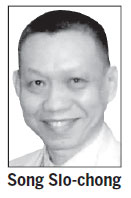CFA stance shift best solution for 'double-no' kids problem
Updated: 2012-07-26 07:03
By Song Sio Chong(HK Edition)
|
|||||||

The means of resolving serious healthcare and social issues arising from births in Hong Kong hospitals to mainland parents has eluded consensus. Some demand amending the Basic Law. Some want a fresh interpretation of the Basic Law to be made. Some want local legislation modified. Others suggest the Court of Final Appeal (CFA) overrule its previous decision in the Chong Fung-Yuen case (2001).
The key issue is whether babies born in Hong Kong, whether their parents have a legal right to reside in Hong Kong or not, should be entitled to the status of permanent residents. This status may not be so attractive to overseas people with Chinese nationality, but may attract many mainlanders. In the mainland, there are about 20 millions babies born annually, even under the single-child policy. If only one percent of pregnant women came to Hong Kong to give birth, the city's maternity care systems would become paralyzed. The health of Hong Kong women who are pregnant might be jeopardized, if all facilities are full.
The Preparatory Committee for the Establishment of the HKSAR was aware of this possibility, and gave an opinion in 1996 that permanent resident status should be given only to new borns who have at least one parent lawfully residing in Hong Kong. Infants born to illegal immigrants, over-stayers or people temporarily in Hong Kong are excluded. The committee called for these restrictions to be implemented through local legislation such as the Immigration Ordinance. The laws were put in place before 1997.
One stipulation under the Basic Law was that a permanent resident of the HKSAR must be a Chinese citizen born in Hong Kong before or after the establishment of the HKSAR. Literal interpretation of this provision can be misleading without taking the committee's opinion into consideration. Recognizing that the committee did not have the power to interpret the Basic Law, the NPCSC which has the power confirmed in its interpretation of 1999 that the legislative intent of all categories of the stipulation were expressed in the committee's opinions.
If the CFA had followed that interpretation in the Chong Fung-Yuen case, there would not have been a problem over Hong Kong citizenship for the children of parents who were both mainlanders. Unfortunately, the CFA failed to respect the NPCSC's interpretation, treating it as foreign materials without binding effect. The CFA went on to declare local legislation unconstitutional and voided the local edict. Under such circumstances, it is clear that the Basic Law should not be blamed. It is the CFA that misunderstood the Basic Law and ignored the NPCSC's interpretation and which now should repent.
As to the interpretation issue, the CFA appeared to allow the literal meaning of the words of the Basic Law to prevail despite the fact that the wording would manifest absurdity or consequences which were never intended by the legislature. Since the NPCSC's 1999 interpretation, which had full consideration of the consequences of the so-called "double-no" children, was already there, it was rather absurd that the CFA insisted on the literal meaning of the Basic Law in deciding the Chong Fung-Yuen case.
It seems to me that it would be rather difficult for the NPCSC to repeat its interpretation, since the first one was ignored. Modifying local legislation may not be a viable solution. Even though the LegCo might pass the amended bill, the bill would still be taken by the CFA as unconstitutional if the court does not fully recognize its previous error in the Chong Fung-Yuen case.
In my opinion, the better way will be for the present CFA to render the previous decision in Chong Fung-Yuan case to be invalid "through want of care". In the US, legal precedents are authoritative and binding, and must be followed. But this is not the universal and inexorable command. In a case involving the federal constitution, the US highest court will often overrule its earlier decisions because correction through legislative action is practically impossible. In 1966, the British House of Lords abolished the rule of legal precedents after finding that its own decisions on points of law were absolutely binding upon themselves.
It is noted that the Basic Law allows the courts of the HKSAR to refer to precedents of other common law jurisdictions. I believe the "double-nos" problem can be resolved by a new case of "double-no" or an existing case of foreign domestic helpers, dependent upon the willingness of the present CFA.
The author is a current affairs commentator.
(HK Edition 07/26/2012 page3)